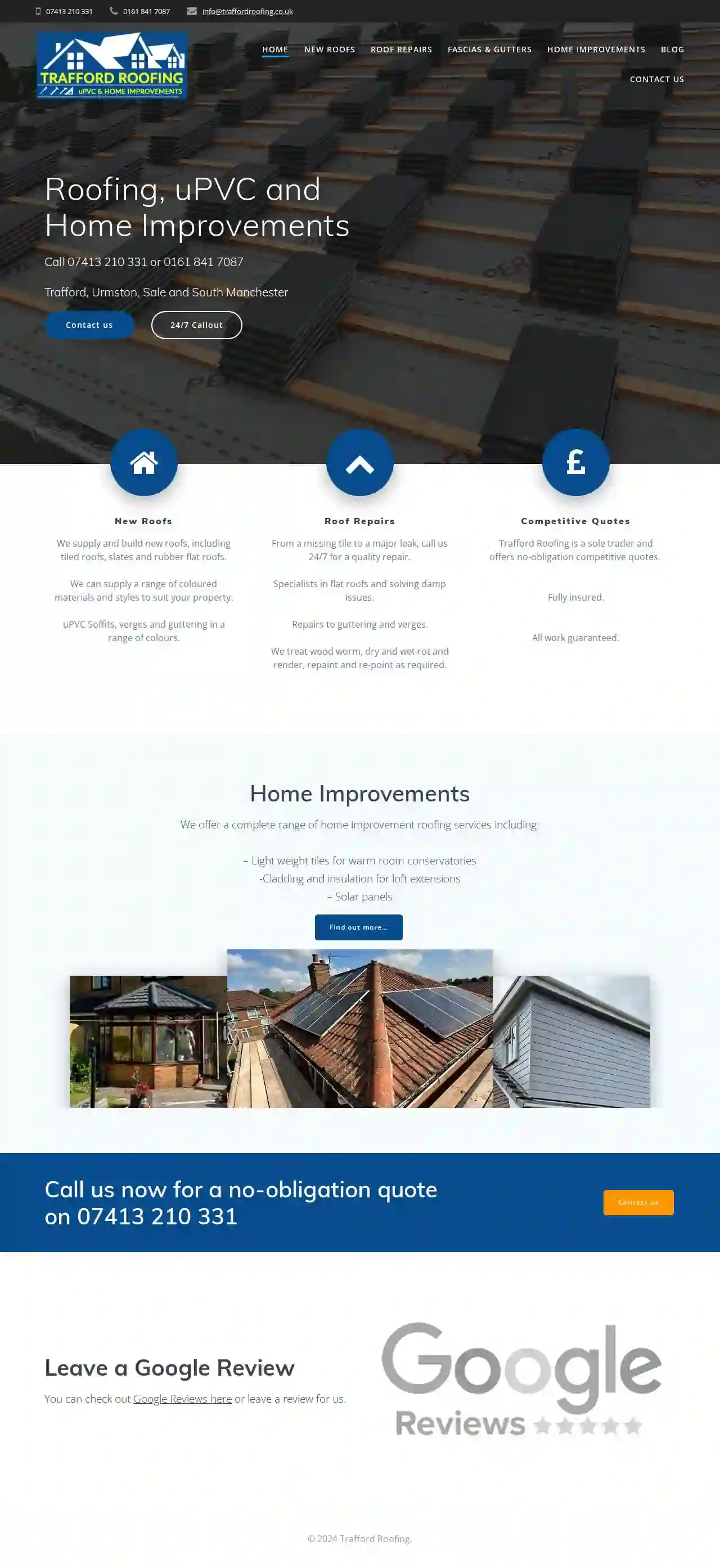Roofing Companies Davyhulme
Find Roofing Companies in Davyhulme
Receive multiple Roofing Company quotes for your project today! Compare profiles, reviews, accreditations, portfolio, etc... and choose the best offer.

Trafford Roofing & Home Improvements
GBTrafford Roofing is a sole trader based in Trafford, Urmston, Sale and South Manchester, offering a comprehensive range of roofing, uPVC and home improvement services. We pride ourselves on providing high-quality workmanship, competitive quotes and a 24/7 callout service. Whether you need a new roof, roof repairs, fascias and gutters, or home improvements, we have the expertise and experience to meet your needs. We offer a wide range of roofing services, including tiled roofs, slate roofs, rubber flat roofs, and uPVC soffits, verges and guttering. Our team of skilled roofers can handle all types of roofing repairs, from minor issues like missing tiles to major leaks. We also specialize in solving damp problems and treating woodworm, dry and wet rot. In addition to roofing, we offer a range of home improvement services, such as lightweight tiles for warm room conservatories, cladding and insulation for loft extensions, and solar panel installation. We are fully insured and all our work is guaranteed. Contact us today for a free, no-obligation quote on any of our services.
- Services
- Why Us?
- Gallery
Get Quote
Over 12,314+ Roofing Contractors on our platform
Our roofing experts operate in Davyhulme & surroundings!
Roofyng.co.uk has curated and vetted Top Roofers in Davyhulme. Find a reliable contractor today.
Frequently Asked Questions About Roofing Companies
- Hot Climates: Opt for light-colored or reflective roofing materials to reduce heat absorption. Consider tile roofs for their thermal mass and heat resistance.
- Cold Climates: Ensure your roof has adequate insulation and ventilation to prevent ice dams and moisture buildup. Metal roofs can shed snow effectively.
- High-Wind Areas: Choose roofing systems with high wind ratings and properly installed hurricane straps or clips to enhance wind resistance.
- Areas with Heavy Rainfall: Ensure your roof has proper drainage and a waterproof membrane to prevent leaks.
- Sagging or Pulling Away: Gutters that are sagging, pulling away from the house, or visibly damaged need repairs or replacement.
- Overflowing Water: If water overflows during rain, it indicates clogs or inadequate drainage.
- Visible Debris: Leaves, twigs, and other debris accumulated in the gutters obstruct water flow.
- Water Damage: Water stains or damage to siding or foundation near the gutters suggest overflow.
- Plant Growth: Plants or moss growing in the gutters indicate standing water and the need for cleaning.
- Style: Consider your home's architectural style and choose a roofing material that complements it.
- Climate: Factor in your local climate conditions. Some materials perform better in extreme heat, cold, or high winds than others.
- Budget: Roofing materials have a wide range of costs. Determine your budget and choose materials that fit your financial constraints.
- Durability and Lifespan: Assess the expected lifespan and durability of different materials.
- Energy Efficiency: Choose materials with good insulation and reflectivity properties to improve your home's energy efficiency.
How do I choose the right type of roof for my climate?
How can I tell if my gutters need to be cleaned or repaired?
How do I choose the right roofing materials for my home?
How often should I clean my gutters?
How do I choose the right type of roof for my climate?
- Hot Climates: Opt for light-colored or reflective roofing materials to reduce heat absorption. Consider tile roofs for their thermal mass and heat resistance.
- Cold Climates: Ensure your roof has adequate insulation and ventilation to prevent ice dams and moisture buildup. Metal roofs can shed snow effectively.
- High-Wind Areas: Choose roofing systems with high wind ratings and properly installed hurricane straps or clips to enhance wind resistance.
- Areas with Heavy Rainfall: Ensure your roof has proper drainage and a waterproof membrane to prevent leaks.
How can I tell if my gutters need to be cleaned or repaired?
- Sagging or Pulling Away: Gutters that are sagging, pulling away from the house, or visibly damaged need repairs or replacement.
- Overflowing Water: If water overflows during rain, it indicates clogs or inadequate drainage.
- Visible Debris: Leaves, twigs, and other debris accumulated in the gutters obstruct water flow.
- Water Damage: Water stains or damage to siding or foundation near the gutters suggest overflow.
- Plant Growth: Plants or moss growing in the gutters indicate standing water and the need for cleaning.
How do I choose the right roofing materials for my home?
- Style: Consider your home's architectural style and choose a roofing material that complements it.
- Climate: Factor in your local climate conditions. Some materials perform better in extreme heat, cold, or high winds than others.
- Budget: Roofing materials have a wide range of costs. Determine your budget and choose materials that fit your financial constraints.
- Durability and Lifespan: Assess the expected lifespan and durability of different materials.
- Energy Efficiency: Choose materials with good insulation and reflectivity properties to improve your home's energy efficiency.